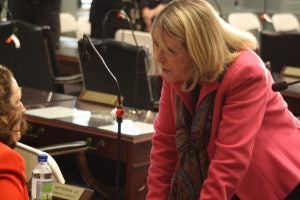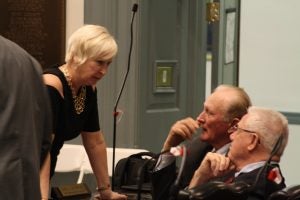Changing the perspective: Female lawmakers talk politics, disparity, sexism
Men outnumber women 49-13 in the Delaware General Assembly. Some of those women are speaking out about about why it's so important that women hold elected office.
Delaware state Sen. Stephanie Hansen, D-Middletown, pulled up to a gas station to fill up her car.
Like the other state legislators, her identity is in full view for other drivers to see. Her license plate reads “Senator” and displays her initials, “SLH.”
As she pumped gas, a man parked at the pump behind her and stepped out of his vehicle. Reading her license plate, he engaged in conversation.
“Oh, do you work for the senator?” he asked.
“No, I am the senator,” she corrected him.
This kind of encounter is not unusual.

Despite their position of authority, women legislators in Delaware say they’re still subject to assumptions based on gender, as well as sexism.
Issues around gender surround the fact there are only a handful of female legislators in the state—despite the fact that women account for more than half the state’s residents.
In Delaware, the number of women holding office in state government has even declined slightly over the years.
In 1997, 19 women served in state-level political offices. A year later, there were 18. Now, there are only 15 — nine representatives and four senators, as well as Lt. Gov. Bethany Hall Long and Congresswoman Lisa Blunt Rochester.
Meanwhile, 49 male legislators are part of the General Assembly in the state governed by John Carney, and represented by U.S. Sens. Chris Coons and Tom Carper. Other statewide elected positions — including treasurer, auditor and insurance commissioner — are all held by men.
Three women serve on New Castle County Council; one on Kent County Levy Court; and none on Sussex County Council.
More women hold offices in city governments, particularly in Wilmington, where there are six.
Politically active women say the numbers will likely continue to rise as more women gradually seek office across the country.
Last year, Blunt Rochester became the first woman — and first African-American — to represent Delaware in the U.S. House. Hanifa Shabazz became the first female Wilmington City Council president. And with two women, Democrats Kathy Jennings and LeKresha Roberts, announcing their bids for attorney general in this year’s elections, advocates for women are hopeful for change in Delaware.
“We have to change voters’ perceptions that women may not be as strong advocates as men when, in essence, they have skills that make them just as strong. In addition to that, women also are better at reaching consensus, and they bring in a new perspective with them,” said Suzanne Moore, founder and president of the Delaware affiliate of Ready to Run, a training and advocacy program for female candidates.
“We need to address things like equal pay, violence against women, social security, discrimination —there are a host of issues that we need to change in our society, and the only way they’re going to get changed is if more women are at the table.”
Breaking down barriers
State Rep. Helene Keeley, D-Wilmington South, doesn’t remember ever not being involved in politics — from stuffing envelopes, to participating in literature drops, to going to polls to support candidates. Her father was a city councilman at-large for a number of years, and she said he always encouraged his family to help the less fortunate.
Keeley decided to run for office in 1990 at 24 — as soon as she was eligible — after some encouragement from community members.
She ran against an incumbent, Casimir Jonkiert, who had held his position for several years.
Keeley was persistent — she lost three elections before she took office in 1996 at the age of 30.
She said she’ll never forget that first day in caucus when she and Shirley Price were the only two female Democrats in the House.
“It was very interesting, because there were several comments, ‘Oh, we’re going to have to watch our language now,’ ‘Oh, we’re not going to be able to do this.’ My response was, ‘Hey, I’m an adult, I grew up in the city, anything you say is not something I probably haven’t heard before,’ ” Keeley said. “It was interesting, because they really hadn’t had a woman in that caucus for some time.”
The number of female Democrats in the House has increased slightly — but not significantly — to seven, which includes House Majority Leader Valerie Longhurst, D-Bear/Delaware City.
While there are still only a handful of female politicians, House Minority Whip Deborah Hudson, R-Fairthorne, remembers even fewer female elected officials when she held office for the first time in 1986 as New Castle County prothonotary.

“I only remember two or three, and they’re dead — it was that long ago,” said Hudson, who joined the General Assembly in 1994.
“It has improved, but it needs to go further. But I don’t think women always have the courage to go out and get more controversial jobs. Perhaps they take less challenging jobs because they’re sure they can do a good job. I think some of it is improperly perceived, because women can do everything men can do, they just have to have the courage to do it and understand what’s expected of them in their job.”
Moore of Ready to Run said those improper perceptions prevent women from getting involved in politics.
Launched last year, the program offered its first six-week course to women of all parties in the fall. They learned about the various levels of government, the issues of the day and where they stand on those issues, how to be comfortable in their own skin, and how to speak well.
The group is an offshoot of Delaware ERA Now, which advocates passing the Equal Rights Amendment to the constitution to ensure equal rights for women. The organization realized, in order to get it passed, it needed more women in office.
“Research shows if you ask a man if he’s ever thought of running for office he may say, ‘Yes,’ or if he needs to do anything to get any kind of training, that doesn’t seem to be a factor for men,” Moore said.
“For women, the natural answer is, ‘Oh, heavens no,’ ‘I would never consider that,’ ‘I couldn’t do that,’ ‘That’s something men do.’ Until the last few years, and even yet, this has been the reason women do not step forward,” she said. “So, they have to be asked to run for office and be persuaded they would be a good candidate.”
When state Rep. Stephanie Bolden, D-Wilmington East, was elected to City Council in 1992, she was one of only two women serving. When City Councilwoman Loretta Walsh ran for mayor, Bolden was the only female on City Council for eight years.
Bolden, who eventually became the council’s first female president pro-tempore, made numerous attempts to encourage other women to run for office, but couldn’t convince any of them. Shabazz was the first woman who got on board with Bolden’s efforts.
Other women may have felt hesitant to run for office because of the campaign culture at that time. Recalling her first campaign, she said candidates, especially women, were the targets of personal attacks from opponents.
“When I ran in 1988, it was just unbelievable,” said Bolden, the longest serving African- American woman to hold office in Delaware.
“I ran against an incumbent that had been there a very long time. And I was teaching school at the time. I remember getting up one morning, and looking out my window, and that person was standing across the street, trying to look to see if anyone was going to come out of my house at that time in the morning.”
State Sen. Hansen said another reason there are still few female politicians today may be because they often feel the need to devote more time to their family.
The senator decided to get involved in community work in the early ‘90s after a cancer scare following the birth of her third child. That experience inspired Hansen to make a difference in her community.
When county council didn’t vote for a county ordinance regarding snow removal for her community, she decided to run for office herself, beating out an incumbent in the primary election for New Castle County Council president in 1996.
While on county council, Hansen was a single parent, raising three kids on $30,000 a year. She decided to put herself through law school to keep a roof over their head, and to this day, she works as an attorney while serving as a state senator.
But Hansen said the double standard that men can seek a career while their wives are expected to take care of the home still exists.
She recalls her experience on a radio show while running for county council president.
“A listener called in and said, ‘How can you even think of running for county council when you’ve got these three little children?’ At that point, my response was, ‘How can I not think about running? This is about representing the people, our community, I want to leave this a better place than I found it, we have a lot of work to do,’ ” Hansen said.
“Still, that’s a difficult question a lot of people struggle with. I can tell you when I was on county council it was an issue I struggled with there. Having served, and looking back on it, and how it affected my children, it was a great decision — because particularly with my girls, and my son, they are empowered, and they see you can make a difference in your community, and you can stand up and you can run for office.”
State Rep. Ruth Briggs King, R-Georgetown, who remains the only female legislator in Sussex County, said when women do make the decision to run on their own accord, they’re often told, “It’s not your time.”
When she ran for office for the first time unsuccessfully in 2000, some men in her party blatantly attempted to discourage her from entering the race.
“I did have high school-aged sons at the time, and I said, ‘Yes, I’ll do it.’ And that’s about the time somebody else came out and said, ‘Well it’s going to take a man to win this campaign,’ ” Briggs King said.

“And that’s one of the things that frequently happens. Looking at who they think would be the stronger candidate, what I repeatedly hear, the kind of candidates they’re looking for — volunteer firefighters, coaches of teams.
“I said, ‘Hold on a minute, what about the auxiliary? What about team mothers? Those soccer moms that are so engaged, as well as the men might be, the counterparts to that, and, of course, we’re seeing more women firefighters and women coaching.’ “I think it’s changing that perspective, and one of the things I do is needle and remind when I hear some male comments. I think that’s a very powerful position I have advocating for women.”
Politics and sexism
The female legislators say, for the most part, they have very good relationships with their male colleagues and feel respected by men in the political realm.
“I think they’re more intimidated by us than we are by them,” Bolden jokes.
However, female lawmakers still face several issues.
When she was first elected, Keeley said, the major obstacle was being taken seriously by men.
Today, the challenge is proving she knows what she’s talking about.
“In some cases, there is a questioning of your knowledge,” Keeley said. “I would say within the last five to 10 years, that was more of a hurdle, as opposed to strictly just having the respect you won the office and have the right to be there.”
She also can recall one experience in the General Assembly when another legislator attempted to intimidate her. Keeley was hesitant when asked to open up about the details, but said she refused to stay silent about his aggressive verbal behavior.
“I just think they thought because I was a female and that this was this individual’s regular order of operation to intimidate and bully someone they thought [they] were going to be able to do that,” she said. “After a very heated conversation, I think that person knew they were not ever going to be able to do that to me ever, ever again — and he never tried.”
Bolden, who said women in positions of authority often receive less respect than men, said she believes the problem is becoming more frequent in Wilmington city government.
“In some cases, men think women are taking jobs away from them. In other cases, they don’t seem to feel that a woman’s place is to be at the top,” she said. “And they’re here because men have been in that role for so long, and the women have been home raising the kids. So, now they’re out in the workforce, they become intimidated.”
Hudson said she can’t recall any significant negative experiences while working with her male colleagues. However, she said female politicians definitely have to prove their worth.
“I think females need to be fairly aggressive, they can’t wait for things to come to them, they need to prove they’ve done their homework, they need to research, they need to be ready to answer questions, and just do the job and do it well and don’t be emotional over intellect,” Hudson said.
“I think often people second guess whether a woman is qualified to be in the job they’re in. Not always, but way too often. I try to do what’s expected of me. When I come to work, I’m a legislator with 15 other people in my caucus. We all came from the same place, we all got elected, we all get paid the same, we have the same desk, the same office, we really are equal.
“My male colleagues respect me wonderfully, we work together. But I don’t think they would if I didn’t do my homework, if I didn’t come in and share in the work and share in the brainstorming of what it takes to be good Republicans and good legislators,” she continued. “You have to earn your keep, in any job I believe.”
Hudson said she experiences more sexism from constituents than her colleagues. She said she often receives harassing emails or phone calls from male constituents, not necessarily her own, who complain about legislators.
“And I think they’re calling me because I’m female. They’re not calling the male [legislators],” she said. “I think a lot of times there are people that still don’t respect women.”
Some of the female legislators point to differences about the kind of questions they’re asked, including about their gender, and comments on their appearance.
“You like to hear that you look nice, but I think sometimes I would like to hear about actual contributions or the job I’m doing,” Briggs King said.
“People may talk about Hillary [Clinton] looking tired, or what Hillary was wearing. They may not do the same thing about Donald Trump — they certainly did about Sarah Palin. Truth be told, sometimes the women do that more to women candidates and elected officials than the men do, and probably they’re not even aware of what they’re doing or saying.”
Moore of Ready to Run said the media portrays women candidates in a different light.
“They talk about how they dress and what their leadership style is, and how they present themselves,” she said. “Women are asked questions on the campaign trail that have nothing to do with the issues, but a great to do with their personal lives.”
Advocating for women
If there are any real differences between the male and female legislators, the women say — hands down — they’re better at multitasking.
Most have a full-time job in addition to their duties as lawmakers. But the women say they’re usually the ones who take responsibility for their children or their elders, run errands and take care of their home.
“Most men that wake up probably stumble into the bathroom, shower with soap, shampoo, a clean towel, that they didn’t purchase or launder — so it’s like magic — and they’ll put on clothes, and possibly eat breakfast someone else has prepared, and know someone is at home taking care of those things,” Briggs King said.
“And the common joke I make is, ‘I have a wonderful husband, but he’s not a good wife.’”
The legislators say the experience of being a woman diversifies the point of view at Legislative Hall.
“I think sometimes when we have heavy discussions, I bring in a perspective they may not have heard about, and I would joke sometimes and say, ‘If you think I’m wrong, go home and ask,’ ” Briggs King said.
She advocated a “woman’s caucus” when she first took office after learning, to her surprise, there was none.
Several states already have legislative women’s caucuses. They push for the interests of women, children and families — and seek to increase the representation of women in state government.
“And of course, when I was making that comment, one of my colleagues said, ‘Well, we don’t have a men’s caucus,’ ” Briggs King said.
“I think the women we have in Delaware’s legislature are very strong women, and, when we work together on issues, we have a tendency to get it done well.”
The women of Legislative Hall have led on measures such as the Delaware CHIP program, which provides low-cost health insurance for uninsured children. After Congress recently came to a consensus on a spending bill, that program will be funded for six years.
Less than two years ago, legislators passed a package of bills that addressed women’s inequality in the workplace, a lack of access to health care and sexual assault.
This year, Gov. Carney announced his support for legislation that aims to offer paid parental leave to state workers.
Keeley said she can recall a few successful bills that wouldn’t have passed if there were no female legislators in the General Assembly.
When trying to pass legislation that mandated insurance companies pay for contraceptives, a couple of men in her caucus couldn’t understand why they should push the bill forward.
“I said, ‘I want you to do me a favor. I want you to go home and talk to your daughters about whether you should vote for this bill or not, and talk to your wife.’ And they all came back and voted yes,” she said.
“One in particular, who wasn’t aware of it at the time, their daughter, because of medical reasons, was on contraceptives. He had no idea they were paying out of pocket for it. So, it was like, ‘Oh, wait a second, there’s more to contraceptives than taking the pill for obvious reasons.’ We bring a different perspective to many different topics.”
Last year, the Equal Rights Amendment failed in the House following some disagreement on the language of the bill, which used words like “human” when addressing equality. Longhurst has recently introduced a new bill with clear language on its aims to secure equal rights for women.
“I’m a strong believer the women should not be diminished, and if we’re going to say ‘equity,’ it’s ‘man and woman,’ and if you start watering down ‘woman’ I take issue with that,” Briggs King said.
“We’ve won a lot of ground for women over the last few years and I don’t want to lose that ground, and I want younger women to appreciate we’ve come this far. We’re not done yet, we have to reflect back on where we were and where we are. When I had my first child, I had no Family Medical Leave Act, I had no protections under the law, and I had so many days of sick time and had to be back at work.
“I was a school athlete, I had no opportunities for scholarships because they were all for the boys. I don’t want to lose that.”
She said “women’s issues” are important for every member of society.
“If someone says to me, ‘Is that a woman’s issue?’ ‘No, it’s a family issue, and a business issue in many ways,’ ” Briggs King said. “Because what affects me affects you, and when we have so many single-family households, things that affect women affect everyone. The woman’s income is not just pillow money, it’s part of that family’s fiber and necessity.”
Bolden said she wants to work on addressing issues like human trafficking and domestic violence. She also said sexual harassment is another topic that needs to be addressed locally and nationally.
“Women have just started getting in the workforce. Look how long it took us to get the right to vote. So, we’re still moving forward, there’s always more hurdles to go over, and here’s another one that’s been subdued for so long and now it’s coming forward,” Bolden said.
“So, I think we’ll have a lot of legislation going forward, and not just in legislative aspects or federal, but in the job place, the one that’s a waitress, or the one cleaning someone’s home, things of that nature.”
Over the past few months, a long list of legislators across the country have been accused of sexual misconduct.
Most of the legislators in Delaware say they’ve never heard of any sexual harassment issues in Legislative Hall. However, Hudson said she believes there were some incidents about 10 or more years ago.
“I think in most cases the people in the building found the victim another job, out of the building,” she said. “That doesn’t solve the problem, it pushes it away like we’re seeing it in other situations, but that’s what happened.”
Hudson said she believes it would be handled more appropriately today, as more women are becoming empowered to stand up for themselves.
Last week legislation was introduced to update the General Assembly’s harassment policy, and to offer regular sexual harassment training to legislators.
“We need to make sure our members are behaved, we have a good process in place when an accusation filters its way to the top or [is] brought to light, and we have to make sure if there is inappropriate behavior that comes to light, it’s addressed swiftly and fairly and in an open way so the public can see they have faith in their elected officials,” Hansen said.
When the senator was a young woman, she worked as a goldsmith in a jewelry shop. Her desk was located at the back of the shop, next to the owner of the store.
One day, the storeowner posted a Playboy centerfold above his desk, which was right in front of Hansen’s. She asked her boss if he would be willing to take it down, because it made her uncomfortable, being the only other worker in the store.
He refused.
A few days later, Hansen made another attempt to convince him to take the poster down.
“He said, ‘Look, I think the female form is beautiful and I like to look at it, no I’m not taking it down,’” she recalls.
So, Hansen asked her boss if she could put up her own poster. He agreed.
Hansen went to a cigarette store, found a Playgirl magazine, and took the centerfold out to place above her desk.
At first, her boss said he was okay with the new image. But by lunchtime, he suggested she take it down.
“I said, ‘Why, is it making you uncomfortable?’ ‘No, no I’m not uncomfortable.’ I said, ‘Well, I like it, I think we should keep it up.’ ‘Fine, fine keep it up,’” Hansen recalls.
“By the end of the day, he came to me and said, ‘Okay here’s the deal, I’ll take mine down, but you have to take yours down as well.’”
That was all she ever wanted.
Hansen said she was comfortable with the possibility of getting fired for being so bold—but said many women don’t have that advantage.
“I kind of wonder though if there aren’t still some workplaces around today where something like that may still exist. Women might feel like they can’t say something—maybe it’s a garage, maybe it’s someplace where men are used to yucking it up with each other, and they don’t feel comfortable saying it,” she said. “I reached the decision I was okay if I lost my job over it. It wasn’t going to be my profession. There’s probably a lot of women that aren’t in that position.”
A Sea of Change
“Can I show you something on my cell phone?” Hansen asks.
She gets her phone out of her bag, and pulls up a picture she captured of the tailgate of a pickup truck that was completely covered with a photo of a woman in lingerie posing suggestively.
Hansen said she believes the image is a sign of the times.
“How awful and demeaning is that and he doesn’t care. It’s stuff like that that I think is a result of electing someone to office who admits to groping women and it’s okay. And there were enough women that voted for him as well. That’s a real problem,” she said.
“And I think what we’re seeing now, it’s not just women stepping up for office, but women being supportive of other women. Women recognizing that sort of behavior is wrong. That the behavior of driving around with scantily clad, sort of pornographic picture, on the back of your pickup truck for everyone to see and have to explain to who’s in the car with them—it’s wrong. Our moral compass has gone the wrong way. And part of that is being reflected in women rising and saying, ‘Enough is enough.’ It’s not until you get women in positions in authority, and can start making the rules and can start pushing this conversation that that’s not okay, you’re ever going to make change.”
Mary Ann’s List, an organization that provides support to female candidates in Delaware who are Democrat and pro-choice, formed in 2015 in response to the current political and social climate.
“After the election of Donald Trump, a lot of women felt demoralized, defeated, and that’s why we see this emergence of a lot of women’s groups organizing for political office, but more generally to influence politics,” said Meghan Wallace, who co-founded Mary Ann’s List about a year ago.
Moore of Ready to Run said of the 30 women who participated in her organization’s program this past fall, three had already declared they would run for a particular office, and three other participants planned to run in 2020.
The women legislators say anyone who wants to run for office must educate themselves on the political system, understand their community and its needs, have a strong campaign message and have a passion for serving the public.
Keeley offers some encouragement for women who want to run for office for the first time.
“Do it,” she said.
“Do it, do it, do it, do it. I promise you won’t regret it. It took me four times, but those three times I lost, each time I learned something new. Not only did I learn something new about politics, I learned something new about myself, and that was the most inspiring journey I ever took. Even though the next day I cried. Every time I lost, I’d wake up in the morning feeling so disappointed, not for me, but for the people who voted for me. But I learned something, and that was the most important thing.”
WHYY is your source for fact-based, in-depth journalism and information. As a nonprofit organization, we rely on financial support from readers like you. Please give today.





